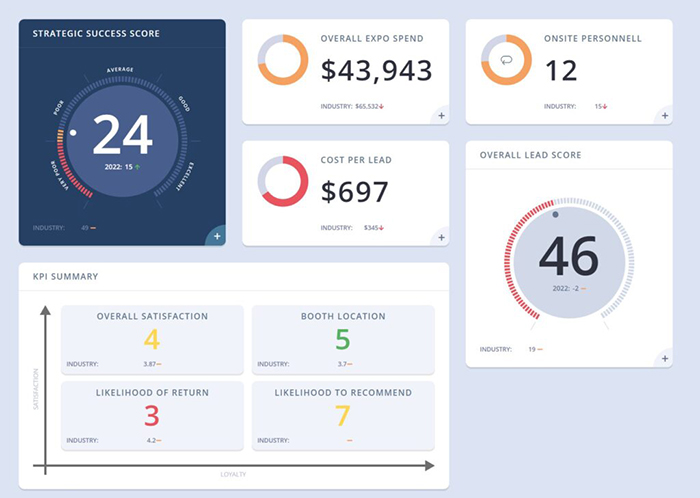Beyond Leads: Will A New Exhibitor ROI Tool Revolutionize Trade Show Measurement?

Beyond leads, it’s always been a challenge for exhibiting companies to measure ROI from trade shows. While leads generated is an important metric for evaluating the value of a specific trade show vs. the overall costs, it’s not the only objective when it comes to exhibiting. However, it’s way more difficult to measure marketing goals like brand awareness, engagement, sales conversions, customer satisfaction and thought leadership from face-to-face.
More and more, chief marketing officers and key stakeholders want data. How are exhibit managers measuring impressions, meetings, quality of leads, conversions and more? And perhaps more importantly, how do exhibitors make informed decisions — beyond anecdotal evidence — about which events to participate in from year to year?
This summer, UK-based attendee feedback company Explori launched Maxbi, a new intelligence platform that tracks performance and measures ROI across multiple exhibits, in the hopes of solving this complex issue.
“It's table stakes now to have a clear ROI measurement for the money that you're spending on marketing and sales initiatives,” said Explori CEO Mark Brewster. “The events industry has been left behind somewhat, and that's definitely a point of friction in a growing number of corporates. We hear this day in, day out.”

Launched 12 years ago, Explori has now measured the performance of nearly 9,000 events worldwide, providing a variety of attendee and exhibitor metrics, benchmarks and insights into the global trade show and consumer show industry. The company has worked with leading trade show organizers such as Informa, Clarion, Emerald and more, said Brewster, who is a former trade show organizer.
He continued, “Explori is used and relied on and trusted by trade organizers around the world to measure exhibitor experience, sentiment, satisfaction and at a survey level, return. It's also used to measure the attendee experience in exactly the same way.”
So will this new solution be the answer that exhibitors have been asking for?
We caught up with Brewster to find out why Explori invested in the development of Maxbi, how the ROI tool works and what insights the product offers.
Back story
“The product was born of many years and many conversations with trade show organizers and with major corporates,” Brewster explained. “It's not exactly a big industry secret that exhibitors have really struggled with measurability for the entire history of the trade show industry, basically.”
During a year of product development, Explori collaborated with a steering group of individuals from numerous exhibiting companies like Cummins, Verizon, Bradley Corp., Formulaction and The Exhibitor Advocate to determine the best way to deliver structured, comparable data to provide measurable data for events.
“I think we've got to the point where, as an industry, we're starting to recognize that if measurement is unsolved, there's a significant longer-term risk factor for the financial health of the events industry, or certainly the performance of some shows,” he said.
How it works
“We wanted to make the product as simple as possible and create a product that an exhibitor can use before the event in the planning process, possibly during, but mainly after the event in the evaluation process,” Brewster said.

Explori is marketing the product directly to exhibitors, who can purchase a license. Brewster also hopes to work with show organizers to sell the product as an add-on or package like lead retrieval.
Using an online form, exhibit managers input the data for a standardized set of questions around the characteristics of the show, size and scope of booth, strategic preparation for the show, budget allocation, quality of leads, promotion, sponsorships and much more — thanks in part to the working groups — as well as various key performance indicators (KPIs), including overall satisfaction, booth location rating, show value score and Net Promoter Score (NPS).
Brewster continued, “At what point do you do the return attribution from an investment? That's very murky waters. So we wanted to create a solution that could look holistically at the objectives that exhibitors have and to create a really robust and objective methodology for calculating a return on objective score, alongside doing lead analytics against lead targets and lead scoring.”
Based on the data that’s input, exhibit managers can gain insight into which trade shows are crucial to their business by getting a lead success score, strategic success score and a return on objectives score for each event.
Why it matters
“Our recent research shows that exhibitors’ inability to demonstrate event ROI to senior leadership is the greatest internal challenge after budget pressures,” Brewster said. “Whilst many senior leaders view trade shows as a valuable marketing channel, 30% are now unconvinced that they are essential.”
Related: SHIFTING SPEND: EXHIBIT MARKETERS FACE BUDGET CHALLENGES AMID GLOBAL INFLATION
He continued, “There continues to be a real friction caused by rising exhibit costs and the absence of data. This puts exhibit marketing at a real disadvantage when competing for budget with other marketing channels, which are often perceived to be more measurable.”
Exhibit managers can slice and dice the data, which can be viewed in multiple dashboards by the individual event, show portfolio or enterprise wide. Exhibitors can currently compare their performance against benchmarks from aggregate data gathered by Explori. Once Maxbi reaches a statistical data threshold, Explori will provide exhibitors with robust, real-time benchmarks.
Will this new exhibitor ROI tool revolutionize trade show measurement? It’s too soon to tell since the product just launched in July, but Brewster points out there’s plenty of room for improvement because trade show measurement is “no more sophisticated for 95% of companies than it was 50 years ago.”
Have some event technology news to share? Please send announcements and high-resolution images to dtormohlen@tsnn.com or lpsavas@tsnn.com.
Don’t miss any event-related news: Sign up for our weekly e-newsletter HERE, listen to our latest podcast HERE and engage with us on Twitter, Facebook and LinkedIn!


Add new comment